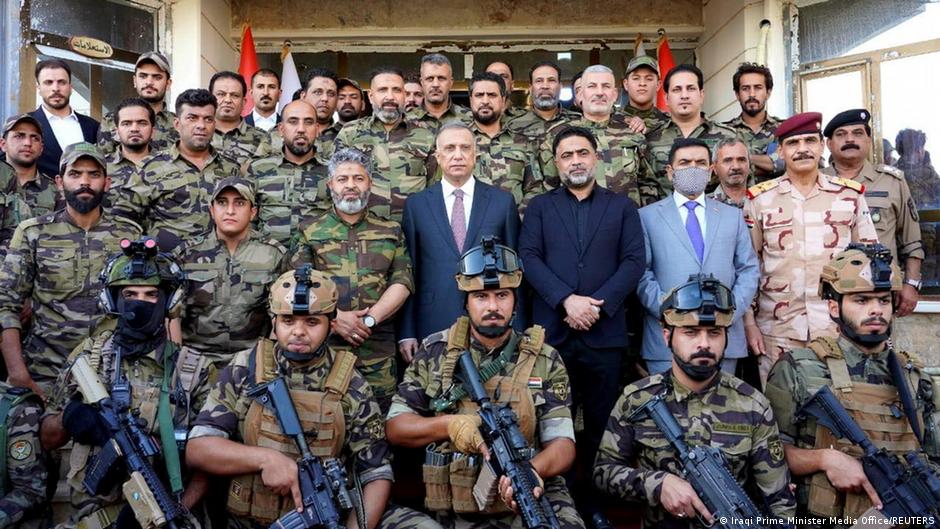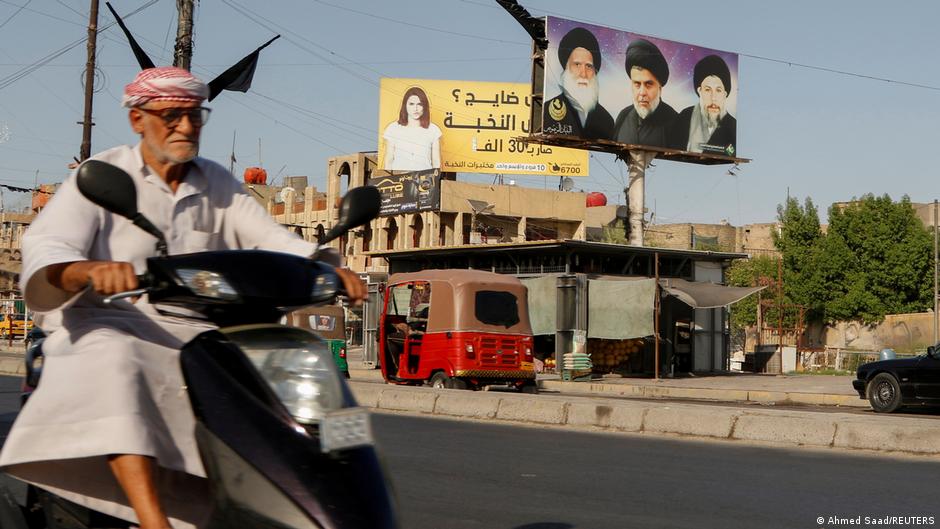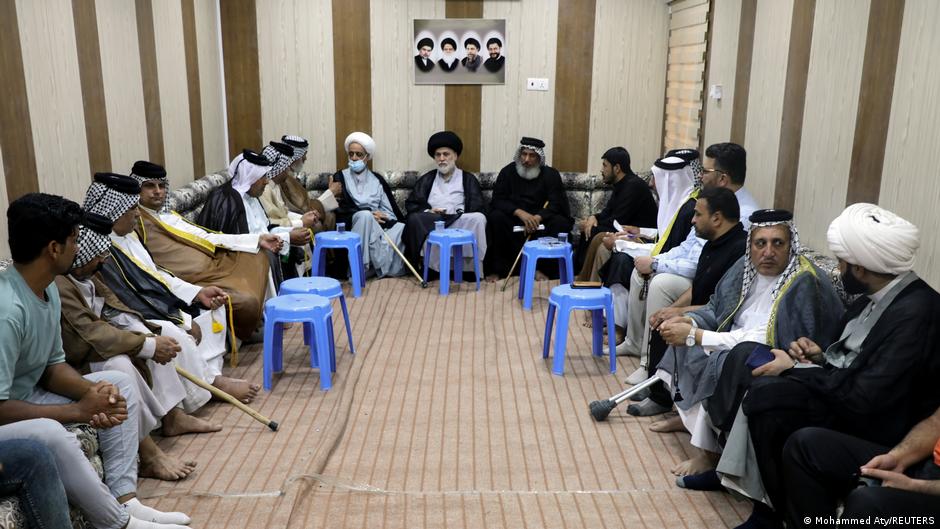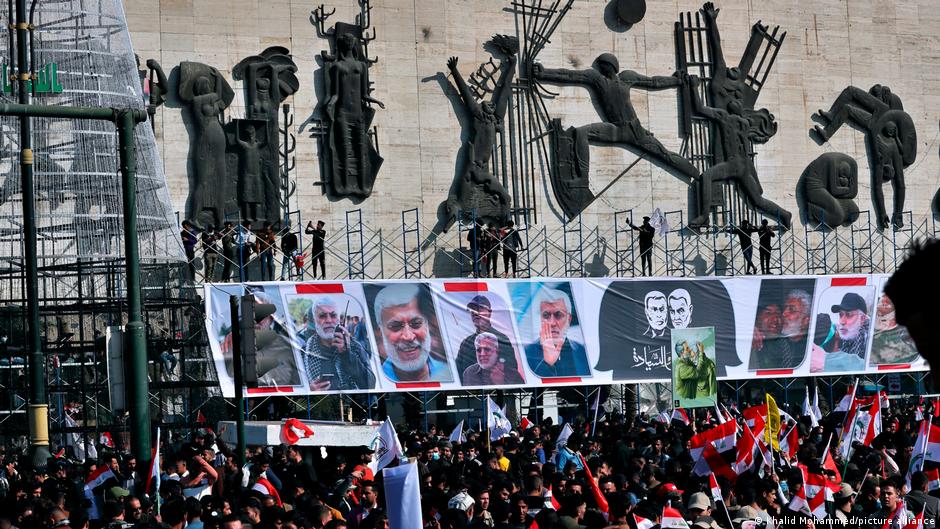Muqtada al-Sadr, the most powerful man in Iraq

On a tense February night, thousands of militiamen loyal to Shia Muslim cleric Muqtada al-Sadr took to the streets of Baghdad and southern Iraqi cities, parading in gun-laden pick-up trucks while state security forces stood by.
It was the biggest show of force by the populist cleric since the mid-2000s, when his followers battled the U.S. occupation and inflicted thousands of American casualties.
Two days later, Sadr made a rare appearance in front of news cameras from his base in the Shia holy city of Najaf in southern Iraq. He said his Peace Brigades deployed because of a terrorist threat against Shia holy sites. Iraq was not secure without his paramilitaries, he added. "The security forces are in a state of collapse."
For Sadr's opponents and allies alike, the cleric’s message was clear: after years on the fringes, Sadr is back. On the streets and in the corridors of power.
Over the past two years, Sadr's political organisation, the Sadrist Movement, has quietly come to dominate the apparatus of the Iraqi state. Its members have taken senior jobs within the interior, defence and communications ministries. They have had their picks appointed to state oil, electricity and transport bodies, to state-owned banks and even to Iraq’s central bank, according to more than a dozen government officials and lawmakers.
These new positions have brought the Sadrists financial power. Ministries where Sadrists or their allies have recently taken senior posts account for between a third and a half of Iraq's $90 billion draft budget for 2021, according to a Reuters analysis. Iraq’s government didn’t comment.

The Sadrists are poised to be the biggest winners in a general election set for October. This growing influence could pose problems for the United States and Iran, both of whom Sadr accuses of meddling in Iraq. He has called for the departure of America’s remaining 2,500 troops and he has told Tehran he will "not leave Iraq in its grip".
Yet some Western diplomats say privately they would rather deal with an Iraq dominated by Sadr than by his Iran-backed Shia rivals. Sadr is a more nationalist Shia figure.
Since the defeat of the Sunni extremist Islamic State in 2017, the United States and the Iran-backed militias that fought the group have turned their guns on one another with rocket attacks and drone strikes. With his Shia rivals distracted, Sadr quietly set to work in politics.
"We found Sadr one of the principal brakes on expansion of Iranian and very sectarian Shia political influence in Iraq after the 2018 elections," said Doug Silliman, former U.S. ambassador to Iraq and President of the Arab Gulf States Institute in Washington.
Reuters interviewed more than two dozen people with direct knowledge of Sadr's activities – including his allies and opponents – and reviewed legal documents to chart how his supporters have taken command of key positions in ministries and state bodies that control wealth and patronage networks – what Iraqis call the "deep state".
Senior government officials and Shia politicians say the Sadrists have learned some of their political tactics from Hezbollah, the Lebanese armed and populist Shia group with which the Sadrist Movement maintains close contact. These methods include ways to avoid splitting the Sadrist vote and so to maximise electoral gains.
Nassar al-Rubaie, a top political representative of Sadr, summed up the Sadrists' revival. "Today, we have Sadrists in positions in every state institution," he said. "This is a blessing from God!"
Cleric Hazem al-Aaraji, a close aide of Sadr, told Reuters the Sadrist Movement is stronger than at any point since 2003. Sadr, he said, is "the most powerful man in Iraq."
Prime Minister Mustafa al-Kadhimi has previously denied that the Sadrist Movement controls senior posts in his administration and insists he is in charge. His government didn’t respond to detailed questions for this article.
A U.S. official declined to comment on internal Iraqi affairs. Iranian officials didn’t respond.A family tradition
Sadr's greatest strength is his popular appeal. It sets him apart from other Iraqi leaders.
His father, Grand Ayatollah Mohammed Sadiq al-Sadr, led dissent among Iraq’s oppressed Shia majority against Sunni dictator Saddam Hussein and was killed by the regime in 1999. Muqtada al-Sadr, 47, draws on his father's martyred status and his own reputation as a cleric who never fled Iraq. Other prominent figures in post-Saddam governments returned from exile in Iran and the West after the U.S.-led invasion.
In 2003, Sadr and his Mehdi Army, a thousands-strong militia formed as a volunteer force against American invaders, defied the U.S. occupation.
Baghdad's sprawling Sadr City district is a Sadrist bastion of three million people. Among them is Jaafar Mohammed, a 37-year-old fighter. He told Reuters he fought against the Americans in the early 2000s. "I sold my daughter's gold earrings so I could afford a gun." He later participated, unarmed, in protests that toppled an Iran-backed government in 2019.
Sadr's appeal extends far beyond Sadr City.
In a mosque in the southern city of Basra, graduates in search of work waited in March to speak to Sadr's religious aide Aaraji. The cleric explained to Reuters that he helps graduates find jobs by talking to politicians, to people in the Sadrist Movement or even to Sadr.
Two of the graduates told Reuters they tried for years through connections with other political parties to get jobs in the energy sector. "The Sadrist Movement were the only people who helped," said 25-year-old Shihab al-Din Nouri. "I got a steady job through them three months ago working in the Basra Oil Company. I'll vote for them in the next election."

A key meeting
Starting in the mid-2000s, Sadr generally stood apart from Iraqi governments that were supported by either America or Iran.
In 2007 he pulled his Sadrist Movement out of the government over its refusal to set a timetable for a U.S. troop withdrawal. In 2008, Prime Minister Nouri al-Maliki led a crackdown on Sadr’s Mehdi Army that killed several hundred fighters. And in 2014, Sadr announced he was quitting politics. Aides say he feared his reputation would be hurt by association with a ruling class that is perceived by almost all Iraqis to be corrupt.
To be sure, the Sadrist Movement continued to hold key posts in some ministries, notably the health ministry, and it continued to field candidates in elections. But it ceased to be a major force in the government of Iraq.
Sadr's attitude began to change in the summer of 2018 at a meeting with several of his most senior political representatives at his home in Najaf, according to two senior Sadrist officials familiar with the episode. The Sadrists had just won their strongest ever election result and controlled the biggest parliamentary bloc. Sadr listened to those who wanted to take top state administrative posts. "They lobbied Sayyed Muqtada for his blessing" to install Sadrists in top jobs, said one of the officials.
Sadr gave cautious assent. "If you're able to correct the mistakes made by previous governments and save the country from chaos, then proceed," the official quoted him as saying. "If you fail it will be on your heads." Sadr declined to be interviewed for this article.Where the power lies
In the months that followed, the Sadrists surprised some observers by forgoing top ministerial positions. Instead they targeted one job in particular that would prove decisive in their future hold on the levers of power: secretary-general of the prime minister’s office, a role that oversees appointments to state bodies.
"Parties supported by Iran didn't appear to understand the value of that post, and were focusing on minister jobs, so they agreed to the deal. It ended up being the most important post the Sadrists have taken," said a lawmaker who was allied with Sadr at the time. A Sadrist official recounted that a personal connection tipped the balance: the Sadrists' candidate was from the same southern city as then-Prime Minister Adel Abdul Mahdi. "Sometimes these ties can affect decisions," he said.
Hamid al-Ghizzi, a Sadrist bureaucrat, took the post and set about ordering the removal of almost all government officials who had been appointed on an acting basis. In a May 2019 directive, Ghizzi said acting post holders were to be replaced by permanent appointees. These new appointments would require the approval of parliament – where Sadrists now had the upper hand. The directive targeted jobs at the level of deputy minister, senior ministry officials and heads of independent state bodies. These roles are involved in awarding contracts, budget spending and ministry appointments.
While Sadr's political rivals focused on the commanding heights, the Sadrists recognised that "sometimes real power lies at the bottom," said a senior government official. "The Sadrists focus on institutions with money and access to resources."

Rubaie, Sadr's political representative, noted that governments are swept away at the ballot box but the state "is permanent and all positions other than the minister are part of the state. A minister comes and goes, but the deputy will stay."
Ghizzi declined an interview request. His office said the secretary-general’s role is the administration of state institutions and political appointments are outside its remit.
Into the void
Still, some posts were out of the Sadrists’ reach. Prime Minister Abdul Mahdi refused the Sadrists’ pick for central bank governor and several other roles under pressure from Iran-backed groups to resist Sadrist appointees, according to a former minister and a lawmaker involved in the talks. "They wanted to control the state oil marketer, central bank, interior ministry senior positions and various government banks. Abdul Mahdi resisted," the former minister said. Abdul Mahdi didn’t comment.
But the last obstacles would vanish within months.
In late 2019, protests erupted against Abdul Mahdi’s Iran-backed government. Demonstrators slammed corruption and foreign influence, with particular venom reserved for Iran. Iraqi security forces and Iran-backed militias cracked down on the unarmed protesters.
Sadr took to Twitter calling for the government’s resignation. His supporters joined the protests. "Having the Sadrist Movement on our side was extremely important. It’s a powerful force and it gave us moral and material support," 31-year-old pro-democracy protester Mustafa Qassim said.
[embed:render:embedded:node:37503]
Abdul Mahdi’s government announced it would resign in November 2019.
Weeks later a drone strike ordered by U.S. President Donald Trump killed Iran’s top Revolutionary Guards commander Qassem Soleimani and Iraqi paramilitary chief Abu Mahdi al-Muhandis at Baghdad airport. The loss of the two men further fractured and divided the pro-Iran bloc.
Into the void stepped Sadr. He used the scattering of his rivals and a weak interim prime minister, Kadhimi, to accelerate the Sadrists' takeover, according to a dozen current and former government ministers and Western diplomats.
Kadhimi, who remains in office, has denied that the Sadrist Movement is calling the shots. "The only thing Sadr asked of me and the Sadrist Movement was: take care of Iraq," he said in a televised interview in May. He didn't elaborate. Kadhimi’s office didn't respond to questions from Reuters.Starting in September 2020, Ghizzi and the prime minister's office signed off on a raft of appointments. The Sadrists took the role of deputy interior minister for administrative affairs, a job that oversees spending and appointments. A Sadr loyalist became a deputy in the communications ministry. Where the Sadrists haven't filled posts directly, their preferred candidates have, making them beholden to Sadr, government officials and lawmakers said.
Posts the Sadrists dominate through allies include a deputy oil minister, the central bank governor and other sensitive fiscal posts, according to oil and finance ministry officials. Sadr aide Rubaie denied that Sadrists control the central bank. Central bank governor Mustafa Ghaleb and deputy oil minister Karim Hattab didn’t respond to questions from Reuters.
A recent report by Chatham House, a London-based international affairs think tank, estimates the Sadrists have taken some 200 of the most influential sub-ministerial positions since 2018.
The Sadrist Movement’s increasing role in the running of the state has helped it push its choice of legislation and approve or veto key government decisions. The 2021 budget allocates more funds to Iraq's southern Shia heartlands, the Sadrists' traditional support base, and to the ministries where it has the most influence, according to senior Shia and Kurdish politicians. That may leave less for northern Sunni areas that were destroyed in the battle with Islamic State and are in desperate need of reconstruction. The Sadrist Movement didn’t comment.
An early general election set for October and a new election law, both pressed for by the Sadrists, favour large parties with a wide popular support base because candidates will require more votes, and could fuel Sadr's ascendancy, legislators and analysts say.
Hezbollah, the armed Shia movement that has come to control much of the Lebanese state, has provided political instruction to the Sadrists, said two Sadrists and three senior Shia officials. For example, in local elections in 2009, the Sadrist Movement calibrated the number of candidates it put forward in each area to avoid splitting the Sadrist vote.

The Sadr aide and two other Sadrist officials said the movement and Hezbollah remain in close contact and regularly share political, economic and military expertise including how to deal with local and regional political crises. They declined to elaborate. The two organizations use a similar approach of local outreach combined with militia and political activity. They have family ties through second cousins and marriage. Sadr’s family historically hails from Lebanon.
A Hezbollah spokesman confirmed the group had provided what he called assistance and electoral instruction to Iraqi factions including the Sadrists, and said relations between the two movements were "ongoing and positive".
Unknown quantity
With elections due in October, the Sadrists are feeling confident. "The (next) prime minister will, one million percent, be a Sadrist," deputy parliament speaker Hassan al-Kaabi said in a televised interview in April.
Most of Sadr's opponents concede that the Sadrists will come first, and their outsize influence in state administration will give them the final say on who leads the government.
That prediction poses a dilemma for Western and regional powers.
Sadr has variously railed against Tehran, Washington, London and Gulf Arab capitals for their interference in Iraq. But he has also been one of the few senior Shia leaders to visit Saudi Arabia and has spent long periods in Iran despite an uneasy relationship with the Islamic Republic.
"Muqtada has good relations with the Gulf, Iran, Turkey," a senior Sadrist official said, but corrected himself after mentioning America in the same breath. "He has relatives in (the holy Iranian city) Qom," he said, referring to Sadr's reclusive older brother, who is based in Iran.
A senior official in Iraqi Kurdistan, the autonomous region which has close ties with the United States, said of Sadr’s geopolitical alignment: "I find it very hard to see Sadr confronting Iran. In the end, Muqtada will be closer to Iran than he will to America."
A Western diplomat said Western nations viewed Sadr as an "unknown quantity" who is the only Iraqi leader able to enact reform and counter Iran-backed militias but retains a deep distrust of America and Britain in particular.
"There would also be concerns over human rights," the diplomat said, referring to Sadr's Islamist stance against homosexuality, alcohol consumption and women's freedoms. In March last year, Sadr blamed the legalisation of same-sex marriage by some foreign countries for the COVID-19 pandemic.
Turning away
Sadr's ascent also carries risks for his movement.
Followers have sometimes been ruthless in their grabbing of state posts, said two senior government officials who oppose Sadr.
Abu Amir, a teacher in southern Iraq, described being threatened by supporters of Sadr to step down from his position as headmaster of a state school – a job his Sadrist predecessor had just been sacked from over corruption charges. They wanted his Sadrist predecessor to be reinstated, he said.
"As soon as I began the job, I got messages from Sadr supporters threatening me and telling me to resign," he said. The deputy education minister – a Sadrist newly appointed in his post – walked into the school a few days later with armed men and reinstalled the disgraced former head. Abu Amir had already fled. He asked that he not be identified by his full name for fear of retribution. The Sadrist Movement didn’t respond to a request for comment.
Some younger Sadrists are meanwhile abandoning the movement.
Qassim, the protester, used to be a supporter. He said he and many others left in disgust after followers of Sadr turned on the pro-democracy activists in early 2020. Sadr abruptly withdrew his backing for the protests a few weeks after they succeeded in their goal of toppling the Iran-backed government.
"Sadr might be gaining state power, but he’s losing people like me," said Qassim.
John Davison & Ahmed Rasheed
© Reuters 2021
